The Celtics Are Ready to Win It All. Is Joe Mazzulla Ready to Lead Them?
Inside his TD Garden office, Joe Mazzulla bounces a soccer ball between his feet. Ten times, drop. Twenty, drop. One juggle gets as high as 50 before it hits the floor. It’s 15 minutes before the Celtics’ opener against Philadelphia, before the defending Eastern Conference champions kick off a season with lofty expectations, before Mazzulla, Boston’s 34-year-old head coach, begins his first year on the job. These are the moments Mazzulla dreads. Not coaching. Mazzulla loves coaching. The deafening roar of the crowd? The Garden is a little rowdier than the Feaster Center, the 2,711-seat capacity home of Division II Fairmont State, Mazzulla’s last head-coaching gig. But it doesn’t faze him. Drawing up end-of-game plays? Mazzulla has been dreaming those up since 2009, when a career-threatening shoulder injury at West Virginia forced him to reexamine his basketball future. It’s the quiet minutes right before the games that make him anxious. “I get bored,” says Mazzulla. “So I do dumb stuff. Like juggling.”
When he gets to the bench, Mazzulla settles into the head coach’s chair, a few feet from the scorer’s table, one row in front of where Mazzulla sat last season, when he was an unheralded assistant on Ime Udoka’s staff. He glances into the stands. He’s sat there before, many times. For Celtics games, even an NCAA tournament, making the 90-minute drive from Johnston, R.I., as a teenager with a cheap ticket in the upper bowl.
He thinks of his father, Dan, a Rhode Island legend. Dan Mazzulla played college ball at then-Division II Bryant. He spent five seasons playing professionally in Chile before returning home, where he became a fixture in high school coaching. Joe was a regular at Dan’s practices. He remembers the energy Dan brought to coaching. “He was passionate,” Mazzulla said. “He wasn’t afraid to tell you about yourself.” He recalls the lengths Dan, who passed away in 2020, would go to pull the most out of his players. “He was just relentless,” says Mazzulla. “And I just loved watching that. The way he led it was ‘I see something in you; I’m not going to stop until we get it out of you.’ You weren’t going to like him sometimes and that was O.K.”
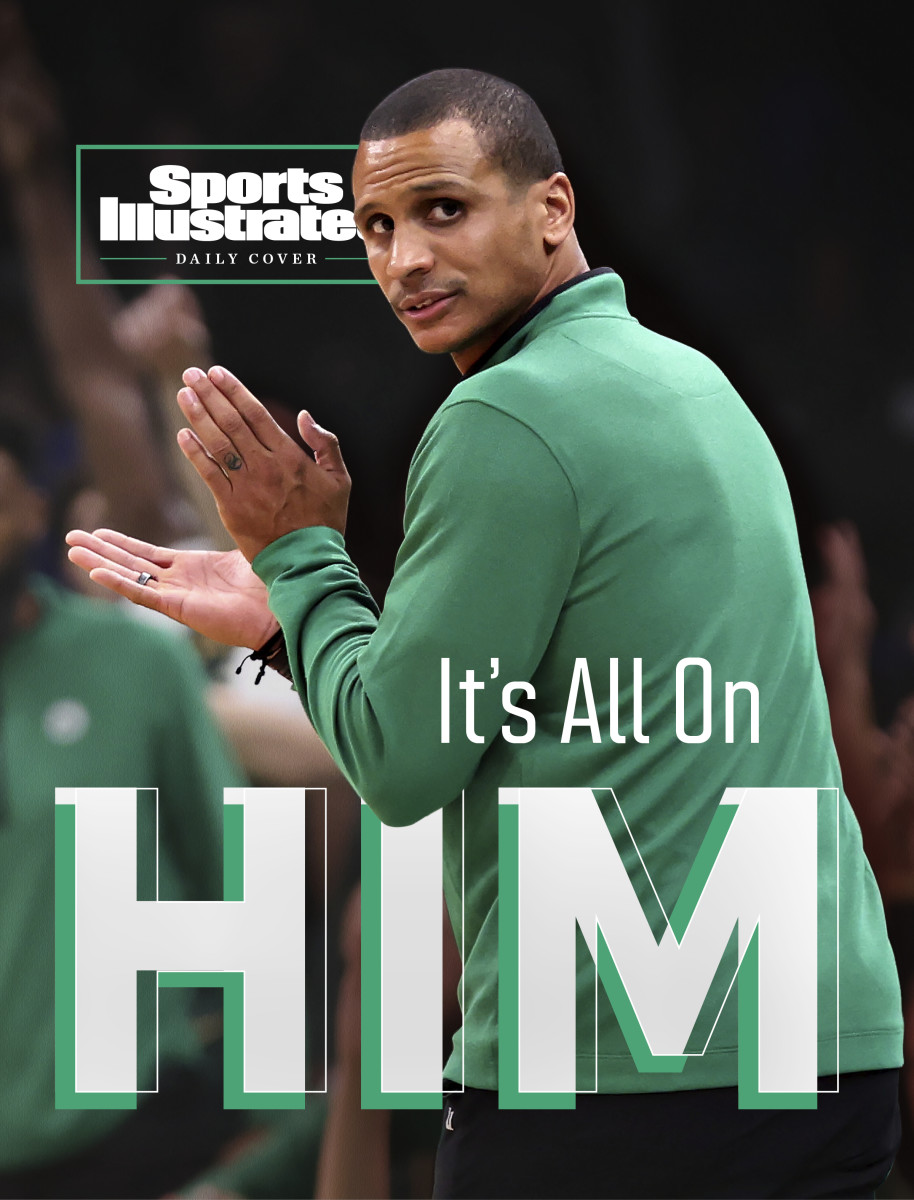
When the game starts, Mazzulla focuses, his jaw furiously working a piece of gum. The Celtics’ defense is swarming early, trapping Joel Embiid, chasing the Sixers’ three-point shooters all over the floor. Boston owned the NBA’s No. 1 defense last season, and Mazzulla was a part of it. A holdover from Brad Stevens’s staff, Mazzulla assisted Udoka in transitioning the Celtics from a traditional, blitzing scheme to the switch-everything system that harnessed Boston’s versatility. “Joe is really good at coaching the details,” says Stevens. “He has an unreal motor. He will work all day long.”
By now, the circumstances of Mazzulla’s sudden ascent are well known, even if many of the details remain murky: Just days before training camp, the Celtics suspended Udoka for a year for breaking unspecified team rules. Stevens then elevated Mazzulla, a mid-level assistant last season, into the top spot. Suddenly, Mazzulla’s own checkered past was national news, and everything from those college-years incidents to how he might juggle Jayson Tatum and Jaylen Brown’s minutes was under the microscope.
On paper, Boston is loaded. Tatum is an MVP candidate. Brown, after missing the All-Star team last season, looks poised to return. Marcus Smart spearheads a stingy defense while Malcolm Brogdon has beefed up the bench. The unknown is Mazzulla. Can the former back-bencher make the rare jump to the head coach’s chair? Can a coach with three years of NBA experience outmaneuver Erik Spoelstra, Doc Rivers and Mike Budenholzer in the playoffs? Can he hold up under the withering media spotlight? For the Celtics, a championship could hinge on those answers.
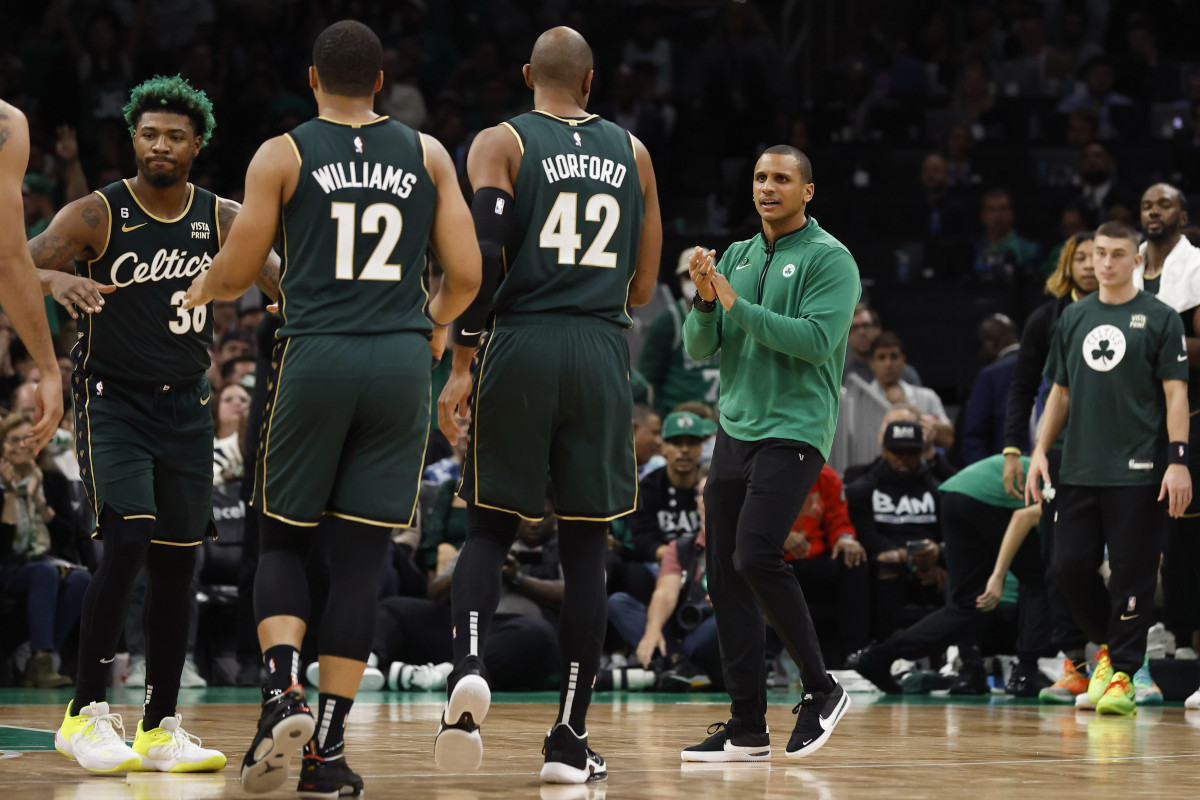
The nameplate on Mazzulla’s office at the Auerbach Center, Boston’s practice facility, is generic. HEAD COACH, it reads, which has saved some printer ink. Between 2004 and ’20 the Celtics had two head coaches. In the last three seasons there have been three, with Mazzulla carrying the interim title after being elevated last month, days after Udoka was suspended.
Inside, Mazzulla reclines behind a wooden conference table, an unopened salad in a container in front of him. He describes the Celtics as a “dream job.” He grew up wanting to be an NBA player, parlaying a decorated career at Bishop Hendricken High School into a scholarship to West Virginia. He led the Mountaineers to an upset win over Duke in the NCAA tournament in 2008 and outdueled John Wall in an Elite Eight win over Kentucky two years later.
In between, Mazzulla’s career path crystalized. Six games into his sophomore season, Mazzulla crashed into a Mississippi player, injuring his shoulder. Two months later, he was on the operating table. Doctors warned him he may never play again. On the court, Mazzulla, a lefthander, worked on his right hand. Off the court he immersed himself in film study, becoming, says West Virginia coach Bob Huggins, “more of a student assistant” on the Mountaineers staff. “I think he realized he really didn’t have a future as a player, and he’s always loved the game,” says Huggins. “He really concentrated on the coaching part of it, learning the game from a coach’s eyes rather than from a player’s.”
Mazzulla agrees. “I was seeing the game differently,” he says.
At the same time that he was reckoning with his basketball future, Mazzulla was also reckoning with who he was. In July 2008, going into his junior year, Mazzulla pled guilty to disorderly conduct and public drunkenness after an altercation with police at a Pittsburgh Pirates game. In April 2009, he was arrested and charged with domestic battery after allegedly grabbing a woman by the neck at a Morgantown bar. West Virginia suspended Mazzulla indefinitely, though he was reinstated before the start of the next season and missed no games. The case was settled, with Mazzulla ultimately pleading guilty to disorderly conduct.
Sitting in his office, Mazzulla says addressing his past doesn’t make him uncomfortable. “We all sin and fall short of the glory of God,” he says. “I’m not perfect. I made the mistakes. I’ve worked to reinvent myself. I know who I am and I know the mistakes that I made. It’s important to be secure about that if you want to be authentic with people.”
Mazzulla says he didn’t have anger issues. “It wasn’t that,” the Boston coach says. He says he didn’t have a drinking problem, either. Any issues, Mazzulla says, were rooted in a struggle for his identity. “When you’re in different environments, you have to be able to control, separate and embrace and evaluate your emotions,” says Mazzulla. “Who I was on the court, that’s who I thought I was off the court. So when your role as a basketball player is to create havoc, be a defensive-minded guy, you think you’re always that. But you aren’t. You need this on the court, but you don’t need this when you’re playing golf with your friends or playing pickup, you know what I mean? And so being able to separate that I think is important.”
“I wasn’t good at handling my emotions or handling adversity. I’ve worked on that a lot. Mental performance is a huge passion of mine because of that. Our brain is a muscle. How can we train our brains? How can we separate, embrace, and evaluate our emotions? How can we use our emotions to help us? It’s no different than physical performance. You want to get stronger, you go in the weight room. You want to get mentally tougher, you got to go to the mental gym.”
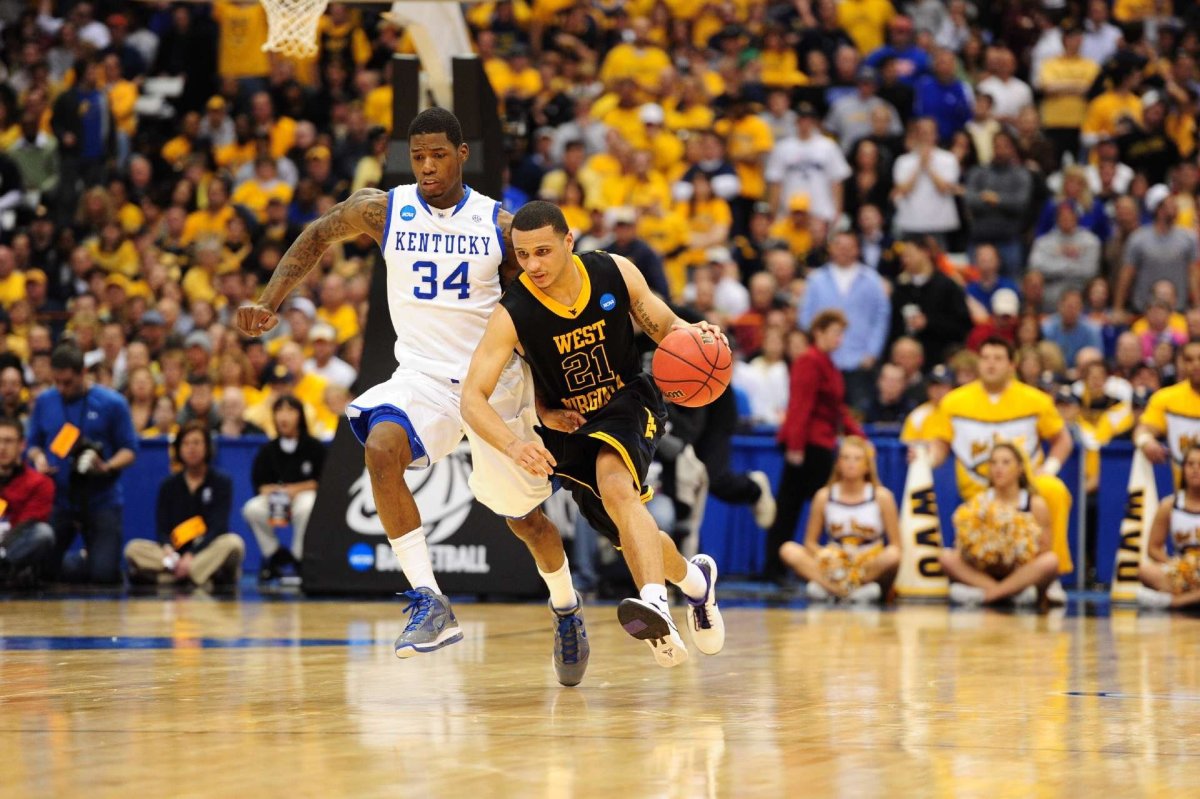
After graduating, Mazzulla latched on as a volunteer assistant at Glenville State. He got a few bucks from a West Virginia booster. He collected a few more working basketball camps. Home was a trailer park. “Mobile Lot No. 21,” says Mazzulla. “I’ll never forget it.” Mazzulla had found his passion. But he was still wrestling with himself. “I didn’t really have an identity,” he says. “I told myself I was Joe Mazzulla, basketball player, for a long time. When that came to an end, you don’t have a compass; you’re a little lost, and so you got to create an identity for yourself. Then I started to see the impact coaching can have. I started to see, this is a way to stay close to the game.”
Glenville State led to an assistant job at Fairmont State. But Mazzulla was fascinated by pro coaching. During offseasons he would break down film, putting together packages for Rob McClanaghan, a noted skills trainer whose client list included Stephen Curry, John Wall and Kevin Love. “And they were great,” says McClanaghan. “He’s a very detailed guy.”
For Mazzulla, the NBA power structure was appealing. “It’s one of the only entities where the leader of the organization makes the least amount of money,” says Mazzulla. “There’s a discrepancy in the hierarchy. At the college level, I just felt like you’re relying on that hierarchy to coach. And here you’re not relying on the hierarchy, you’re relying on your competence, your character, your humility and your ability to manage people.”
Mazzulla would soon get the chance to test himself with professionals. In 2016, after three years as an assistant at Fairmont, he was approached by Ronald Nored, a former Stevens assistant, about joining his staff in Long Island, with Brooklyn’s G League affiliate. Mazzulla was interested. He had recently left Fairmont to be a stay-at-home dad to his newborn son, Emmanuel. To make extra money, he worked six-hour shifts as a bar back. In by 9, out by 3, up with Emmanuel in the morning.
But Nored wanted him, and an NBA position, even in the G League, was too good to turn down. The Nets, though, couldn’t create a position. So Nored called Stevens and Scott Morrison, the head coach in Maine, Boston’s G League affiliate. “I had to look him up,” Morrison says. After spending a weekend getting to know Mazzulla, Morrison—who was looking to add someone with playing experience to his staff—agreed to hire him. Morrison was quickly impressed, and the pair clicked immediately. “Joe is the kind of coach who is always looking for the next way to get an edge,” says Morrison. “He’s one of the most competitive people I have ever met.”
The two would stay up late, studying G League tape or overseas games, swapping notes the next day. But Mazzulla was lonely. He left his family in West Virginia (in addition to his son, Mazzulla is a husband to his wife, Camai, and stepfather to her son, Michael). He lived in the team hotel. Without a car, Mazzulla drove the team van to and from practice throughout the Maine winter. Late in his first season, Mazzulla was offered the head-coaching job at Fairmont State. He accepted.

“I couldn’t pass up moving back home,” Mazzulla said. “So many great people have done things for me in West Virginia, and Fairmont’s a great school. And it was a chance to be a head coach at a young age, which I think people hold in regard. But it was really hard because I was scared if I left the G League, I wasn’t going to come back.”
Mazzulla went 21–8 in his first season at Fairmont State. That spring, Danny Ainge called. Ainge, then the Celtics president, offered Mazzulla a player-development job. Mazzulla declined. “The timing wasn’t right,” says Mazzulla. The next season, the Fighting Falcons went 22–9, earning a berth in the NCAA Division II tournament. Stevens called. Before the pandemic, Stevens used to hold an annual conference in the fall, inviting coaches from the college and pro ranks to come and share knowledge. “A two-day think tank,” Stevens says. Mazzulla spoke at one, and Stevens came away impressed. He admired Mazzulla’s decision to take the job at Fairmont.
“You have so much more responsibility as a Division II coach,” Stevens says. When Micah Shrewsbury, a longtime Stevens lieutenant, accepted a head-coaching job at Penn State, Stevens thought of Mazzulla. He asked Morrison. “Scott swore by him,” says Stevens. Says Morrison, “Lots of coaches are good at X’s and O’s. A lot of coaches are good at building trust. Joe is a guy who is great at both. He can coach the game. He can build that trust with a guy. He can build them up. He can tell them to f--- off. He has that kind of juice. Not many coaches have both.”
Stevens offered Mazzulla a job. This time, Mazzulla accepted (and this time, his family moved along with him). “I tried not to talk at all my first year,” says Mazzulla. “Just get a masterclass in coaching.” Stevens assigned Mazzulla to work with Kemba Walker. Reunited with Morrison, who joined Stevens’s staff in 2017, the two dove into how teams defended Walker. Mazzulla observed how Cody Zeller, Walker’s teammate in Charlotte, would take an extra dribble when teams attempted to deny dribble handoffs, getting the ball to Walker doubling back the other way. Soon, the Celtics were running the same play. “Zeller it,” says Morrison, now the head coach of the G League’s Salt Lake City Stars. “I’m still teaching it today.”
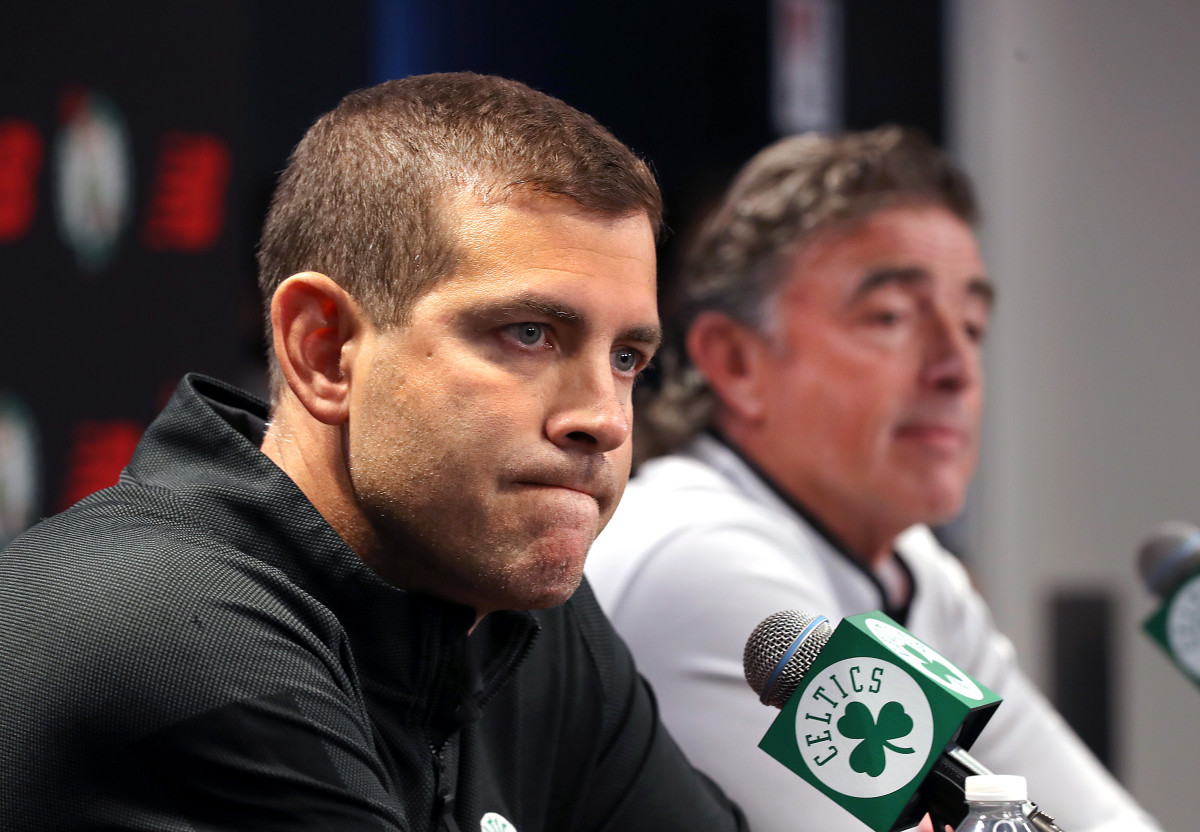
Brad Stevens had a question. It was late September, just a few days before the start of training camp, and the Celtics were scrambling to come up with a plan in the wake of Udoka’s season-long suspension. Stevens believed Mazzulla was ready. “He’s an exceptionally sharp and talented person,” Stevens says. “I believe strongly in him and his ability to lead people, his ability to galvanize a room and get behind them.”
Stevens had interviewed Mazzulla, as he did all his assistants, before hiring Udoka. And last summer the Jazz, now led by Ainge, had Mazzulla among finalists for its head-coaching job. “It felt like a natural fit,” says Stevens. “In my opinion, the last thing we needed to do was mess with our continuity even more.”
Mazzulla knew coaching. Stevens wanted to know if he was ready for the scrutiny that came with it. Stevens, who says he vetted Mazzulla before hiring him as an assistant, was satisfied with Mazzulla’s explanations about the college incidents. Still, he wanted to be sure Mazzulla knew that by accepting the job, he was going to have to explain them again. “You have to have a thick skin to be put out there like that,” says Stevens.
Mazzulla credits his faith for helping him change. He married Camai in 2014, immediately becoming a stepfather. “It made me grow up,” says Mazzulla. “She was very adamant on what’s important to her life and what’s important for her son and for her family. She set a standard. I had to man up to that standard.”
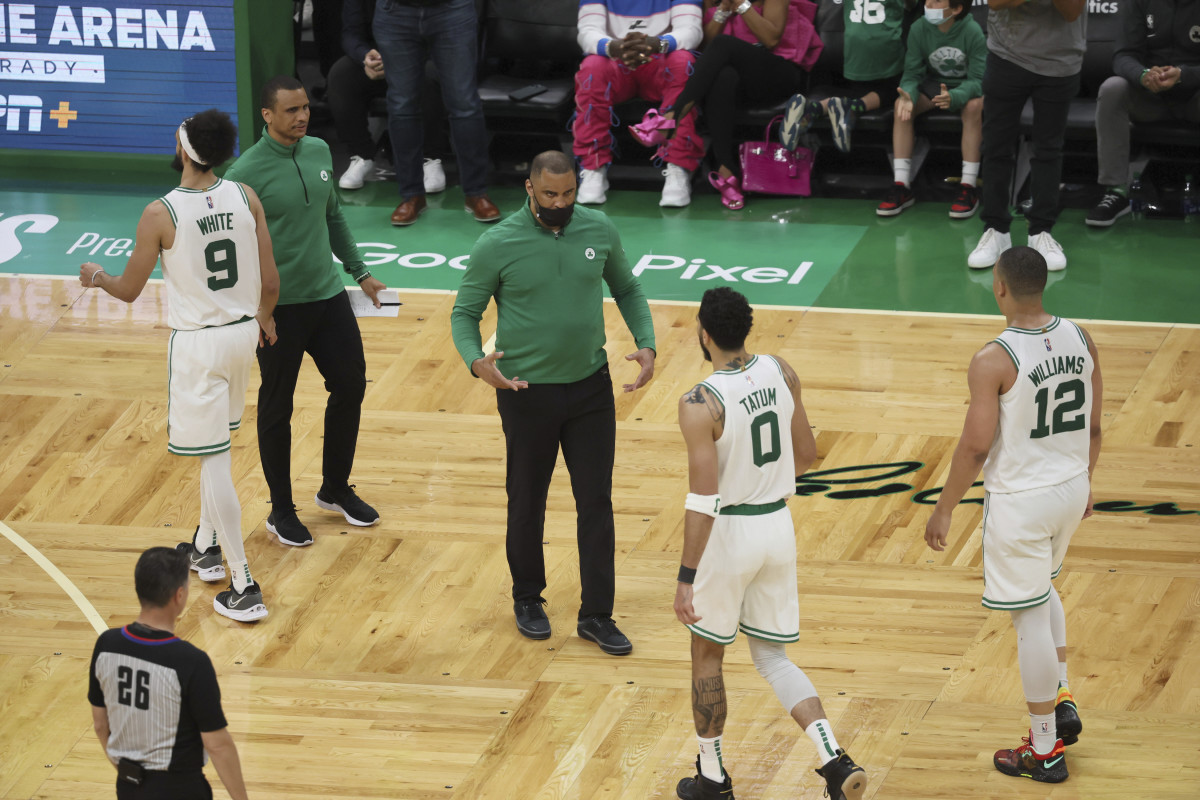
Boston won its opener against Philly, 126–117. In the locker room, Mazzulla got a water bottle bath from players; in media interviews afterward, they showered him with praise. “Tough as nails,” Jaylen Brown said. “Oozing” confidence, added Marcus Smart. Said Jayson Tatum, “The thing that I like about Joe and admire about him is that he’s very honest that he doesn’t know everything. He wants us to help him out as much as he’s helping us out. It’s like we’re in a relationship, and we’re all on the same page and trying to accomplish the same thing. We’re all in this together.”
Under Mazzulla, the Celtics have hardly missed a beat. Boston is 3-1 after their loss to Chicago on Monday (a game that ended with Mazzulla watching from the locker room after getting ejected in the third quarter). Mazzulla says he isn’t looking to change much from last season. “I think the players will tell us what we need to do,” he says. He’s not trying to be Udoka. He will lean into his work ethic. “My biggest concern is I might have to pull him aside just to go hit some golf balls,” says Stevens. He won’t shy away from confrontation, either. “There’s no bulls--- with him,” says McClanaghan. “He goes right at you. He’s real.”
“This team has been coached by two great coaches,” says Mazzulla. “One [Stevens] was technical and very deliberate, another [Udoka] had great feel, [offered] player empowerment and so I got to see both. I think the team is going to need a version of everybody. And I think based on how the short term goes, you decide what a team needs in that moment. To predetermine how you’re going to coach your team throughout a season, I don’t think is the right way to go about it because you never know what you’re going to go through, whether it’s good or bad.”
Sometimes it’s good and bad. After squeezing out a win over Orlando on Saturday, Mazzulla warned that the team needed to be sharper. “We can’t create this expectation that things are always going to go our way and that we’re always going to feel comfortable,” Mazzulla said. “It’s not going to be that way.” It needed to be said. And Joe Mazzulla, head coach, knew he had to say it.
Watch Celtics games live with fuboTV: Start a free trial today.
• James Wiseman Is in a Golden State of Mind
• The Celtics Are Out to Prove Last Year Wasn’t a Fluke
• All Eyes on Zion Williamson
